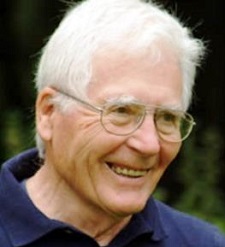06 Jun James Lovelock, Gaia Guru

Stephen Hawking is the brilliant scientist who wrote the best seller, A Brief History of Time. James Lovelock’s scientific resume is so long and lofty he used to work with Hawking’s dad, Frank. They met in the 1940s at the British National Institute for Medical Research where Lovelock was searching for ways to help heal burn victims from World War II.
That was just one stop in a 70-year career as a self-made scientist, inventor and author. Lovelock thinks his most valuable contribution was the Electron Capture Detector (ECP) which he invented during a stint at NASA. The ECP can detect atoms and molecules in gas. It proved essential to efforts to help close the hole in the ozone layer. The ECP also helped to substantiate the case about pesticides made by Rachel Carson in 1962 in her landmark book, Silent Spring.
Subsequently, Lovelock achieved more public renown for his creation of the Gaia hypothesis which holds that Earth is a self-regulating organism — sort of like Mother Earth, but no hugs. Loverlock spelled out the theory in 2006 in the book, The Revenge of Gaia, which put him at the front ranks of the gathering crusade to combat climate change.
But, in 2012, Lovelock’s thinking took a dramatic turn.
He publicly revised some of his earlier views. He still believes climate change is occurring, but at a slower pace than it seemed. Lovelock said he was previously an “alarmist” who was too hasty to believe the computer models attempting to accurately correlate carbon emissions and global temperatures. Lovelock being Loverlock, he didn’t just apologize for himself. He apologized for many others, naming names including that of the one-time global warming icon, Al Gore.
The turn-around briefly made international news because it fit so neatly into the polarized preconceptions that roil the politics of climate change. In the dumbed down dichotomy, Lovelock might be seen as a right-wing Raging Grandpa who counters our local chapter of the Raging Grannies. But that’s a disservice to him, and to all of us, including well-intended green activists.

Fed Up, But Funny
At age 95, Lovelock is not just smart. He’s fed up – fed up with alarmists, deniers, right-wingers, left-wingers, our political leaders, the news media, our collective “incorrigible ignorance” and the “confederacy of dunces” of elites who rule us all. But, he is not just fed-up. He is often insightful and occasionally hilarious.
You can take this all in – or try to – through his new book, A Rough Ride to the Future. In it, he makes his case for a more deliberate, smarter approach. Some reviewers note the book is aptly titled. A Rough Ride is not a good read for the beach. But it’s a great book if you want to sneak past the high priests of climate change ideology to better understand what really might be going on.
Growing Up
Lovelock grew up in a working class English family. His mom worked in a factory. His dad learned to read as an adult. Lovelock was blessed with an opportunity for an early start to school, but he hated it, calling “school, a place I saw as a prison, and an unjust punishment for the crime of being young.”
But not even school could destroy his emerging affection for the practical sides of science. “Engineering and science are like a married couple that has never fallen out of love. Neither one could exist without the other: even a mathematician performing his intricate acts of intuition would be lost without a pen and paper, and who but an engineer could have made them? Where would a biologist be without a microscope? Galileo is remembered as a scientist, but he was first a superb engineer who designed and made a telescope with sufficient resolution to see the satellites of Jupiter.”
While his intuition “hints” to him that climate change believers are probably right, he is frustrated by their focus on carbon emissions and he nearly despairs over our inept political responses to climate issues and related topics.
As for “settled science,” he is aghast. “Some scientists, including me, are skeptical about the polarized arguments for and against belief in climate change. Our skepticism arises from our creed, which says ‘Nothing is certain’ … These are stark statements and difficult to explain and may be why good scientists are often regarded as eccentric.”
Our dilemma
Lovelock tracks our dilemma to 1712. That’s when a blacksmith in Devon, England, Thomas Newcomen, invented a steam engine with capacity to efficiently pump flood water from coal mines. For millennia before that moment, humanity possessed the ability to change its surrounding world through engineering and construction skills that date back to the Pyramids. Romans were great engineers and its ruins show the Port of Carthage was a stone wonder to behold in 400 BC.
In Lovelock’s, theory, the Newcomen engine was unique because it changed humanity’s capacity to use a form of plentiful fossil fuel as a practical power resource. Those in the military might call it a “force multiplier.” The days of literal horsepower were inexorably drawing to a close and the Newcomen Age was launched in a highly nurturing environment. England at that time had tons of cheap coal, hundreds of coal mines, a bevy of inventive entrepreneurs and a motherlode of mechanical talent. Put it all together, and it launched a period of what Lovelock calls “evolutionary inflation” that rapidly brought us the world we enjoy and worry about today.
Lovelock’s diagnosis of our climate-related dilemma boils down to two root causes – prosperity and population. But, nobody wants to be poor or revert to being poor. Over population is not good, but what’s the corrective? De-population? Who leaves? Who breeds? Who decides and how?
Writes Lovelock: “Remember that if the world population was only one billion, none of these torments would trouble us.” He argues that global carbon emissions from cars are matched by carbon emissions from the literal life breath of people, livestock and pets. In another section he adds: “To reduce carbon dioxide emissions effectively in the face of an ever-growing number of people is probably beyond the power of any government, democratic or dictatorial.”
Nuclear Option
Lovelock believes nuclear power is the best near-term option available to curb carbon emissions, but he feels the technology is stymied by a combination of ignorance and intuition. Children in many ways of the Newcomen Age, most of are blissfully unaware of the nuts and bolts that make it all work. Writes Lovelock:
“Most of us are functionally innumerate and have no instinctive sense of the difference between a part per million and a part per trillion. If your glass of apple juice contains a milligram of potassium cyanide and you drink all of it, you will be unharmed. But if the juice contained a gram of cyanide you would most certainly die…”
“Now consider a newspaper article that claims ‘Scientists have found cyanide in apples’ and then goes on to explain how poisonous it is and lists those unlucky enough to have died from swallowing cyanide. This is how we are misled, and why so many are fearful of all chemicals and all radiation.”
Lovelock argues all the factors from his cyanide apple hypothesis were illustrated by the overwrought response to selected aspects of the 2011 Fukushima tsunami and nuclear plant radiation leak in Japan. The awful news of those events sparked panic near and far, including Los Angeles, where people bought up the city’s entire stock of potassium iodide, an antidote for radiation poisoning.
According to Lovelock, the amounts of radiation that reached Los Angeles were too small to measure. “What the Angelinos and the journalists did not know, so great was their ignorance, is that the potassium of the potassium they swallowed was more radioactive than the iodine from Fukushima.”
Earthquake damage from the tsunami claimed lives by the thousands. The related nuclear breakdown claimed no lives (at least, so far).
Oxymorons
Lovelock probably loses his membership forever in the Green Club through his criticisms of “renewable energy” and “sustainable development.”
“Foolishly, politicians across Europe have been excited to ejaculate prematurely a set of laws that hamper our ability to cope with the consequences of climate change. Huge sums (of money) that should have gone on sensible adaptation have been squandered on the renewable energy resources, regardless of their efficiency or environmental objections, and on pointless attempts to achieve that ultimate oxymoron, ‘sustainable development.’
Lovelock is also blistering in his critique of the green political movement that drives the elected officials who are ever eager to steer various climate-change bandwagons.
“Urban and suburban green ideology talks of saving the planet, but it has mainly become another radical political movement … It is so different from my naïve and simple thinking that it would be wrong to regard this book as ‘green’ in the modern sense. I find it sad that urban greens judge most of us guilty of causing adverse climate change and do so without due process of moral and scientific evidence. There is no reason for us to feel guilty.”
In another part of the book, he states: “The idea of ‘Saving the Planet’ is a foolish extravagance of romantic northern (latitude) ideologues, and probably much beyond our ability.”
Ocean View
Eventually, Lovelock feels we’ll find the technical data to track the pace and extent of climate change in the depths of the ocean. He says that in earlier thinking, he did not properly account for the scale of the ocean, which covers 70% of the world’s surface and includes a volume of liquid beneath the surface that most of us find unfathomable.
Writes Lovelock: “I find it extraordinary that any projection of the climate decades ahead could be made when we know so little about the inner climate of the ocean. The near certainty we do have about the ocean is that it stores at least a thousand times more heat than the surface and atmosphere.”
In the past, Lovelock used metaphors like “frying” or “baked” to describe climate impacts. His present allusions tend to “steamed.”
“We do not know where in the ocean increases in heat may be going, but some must almost certainly go to warn its skin, which is also very largely the skin of Gaia. The resulting steam rises, drifts north and south, and condenses on those of us who live nearer the poles. This way the heat of global warming is spread out, but brings the storms, rains and floods. To keep cool, human beings sweat and it may be that Gaia is sweating now.”
It’s A Small World After All
Riffs like these go on for pages and can make Lovelock seem like more of a curmudgeon than he is. Nearly ever passage concludes with his optimism for our prospects as the creative aspects of the Newcomen era continue to evolve. “Coming to the rescue is an army of super-nerds,” he writes. “Slow-moving natural selection has at last evolved a species – us – which can invent and so increase the rate of evolution a million times.”
Near term, he writes, the worst that might happen is northern climates acquiring the same conditions that now prevail in Singapore. Uncomfortably hot at the dawn of the Newcomen Age, it is now an air-conditioned symbol of the prosperity wrought by the Devon blacksmith. It’s also a wonderful place to live if you are not adverse to endless streams of Disney music and a political culture that might require continued evolution of its own. Then again, as Lovelock might ask, who are we to talk?
Longer term, Lovelock states we may adapt by building and living in sealed super cities similar to the enormous, naturally cooling termite nests that flourish throughout Australian deserts. Longer term still is the impact of Solar Heating – no, not the renewable energy technology, but the predicted growth and eventual demise of the Sun and the time when everything around here might well go dark.
But, the Raging Grandpa leaves us many warm notes to close on, including this one:
“What we are doing to the Earth by our industry has already changed it, and more change is likely to happen, but nothing so far justifies the frantic cries of environmental activists, who amplify such hyperbolic cries as: And it will destroy all life on Earth!’ So, let us keep our cool as the Earth gently warms and even enjoy it while we can.”
These and other Lovelock observations could prove to be words to live by. But how will we ever fit them into a “tweet”?
